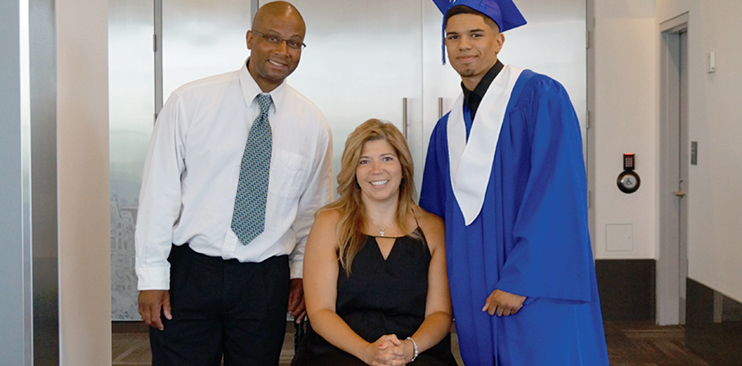Following her story in the 2016 spring issue of Outspoken! magazine, Moving Forward Day at a Time, I spoke with Michelle Earle to find out how she was doing.
Michelle continues to learn new ways to adjust to her disability and this spring, she was the keynote speaker at the Ottawa Hospital Rehabilitation Centre’s Spring into Motion annual fundraiser where she shared her story of life after a spinal cord injury. We talked about her life, her work, her injury and what she does to stay healthy not only physically, but emotionally, too. It has been more than three years since she sustained a spinal cord injury at the T12 level after she lost her balance while walking down a steep incline in the dark and falling about nine feet.
Although like anyone who has sustained a spinal cord injury, there’s a lot to adjust to, but day by day, life is less difficult than it was at first. Michelle finds support from her husband Michael, with whom she can talk about anything, her three children, Jasmine, Joshua and Jordan, and her large network of friends. She knows the importance of maintaining her mental health and sees a counsellor when she needs to.
She maintains her sense of independence by doing the family grocery shopping on Sunday morning, through her career as a mental health coordinator at the Ottawa Youth Services Bureau, and by teaching spinning classes at GoodLife Fitness in Orleans from her hand cycle. Fitness has always been important to Michelle so she is always looking for opportunities to try new sports like adaptive rowing and waterskiing. So far, she has done alpine skiing from a sit ski which she liked. It gave her a sense of control; she felt part of a community event and a sense of belonging.
“Year one for me was about acceptance. I had to accept that there are things I could not do anymore. I was in mourning and experiencing a sense of loss. No more half marathons. But the question for me became — if I can’t do that, then what can I do? I also felt guilty for my injury and that I was imposing on my family. I realized though that these feelings were mine and it wasn’t about them but about me.”
Last year, Michelle fractured her femur from doing something as innocent as putting her socks on and getting dressed. She was on bed rest for six weeks. She also became depressed from not being able to go out and it was also winter, which brings darker and colder days.
“Not being independent, your mind can go to dark places and I kept apart from my friends, got depressed and lonely.”
Her husband, family and friends were a great support and helped her get better. But for Michelle, it really hit home how serious her disability was when she couldn’t feel pain.
Michelle strives to promote awareness and sensitivity of the needs of people with disabilities.
“Because I use a wheelchair, I don’t always have the freedom of going into places that have stairs or an accessible washroom. Before my injury, I didn’t understand the issue of cars parking or idling in a reserved spot for people with disabilities. Now I do. I approach them saying that there are others who are trying to find a spot because you are waiting for someone at the door. But I know I can’t fight everyone’s battles.”
Michelle also feels very strongly about reserving accessible washrooms specifically for those who need them. “If you have four washrooms and one is accessible, if you don’t need it don’t use it. I can’t wait more than two minutes. It upsets me when there are other washrooms that are available for use. I think it’s a lack of awareness on their part rather than trying to make things difficult. When you use a wheelchair, you have so few things that are accessible to you and then there are people without disabilities who have no need for them. You feel like you have been wronged — like you don’t matter.”
Dealing with her feelings is a big part of her recovery. “You are not in a hopeless situation. Keep an open mind and look for ways to do things you used to do but in a different way. It took me a long time to realize that asking for help is a sign of strength. We all need help once in a while. People don’t know how you are feeling unless you tell them.
“When I sustained paralysis, people rallied around me and were wonderful, but some moved on. Some are still around. Even though I am still living with this adjustment every day they don’t always ask me how I am managing. Unless you share where you are at any certain point, people don’t know. In one of my blogs I spoke about when people ask how we are and we always say we are fine. But it opens the door when you ask, “how are you managing?”
This fall, Michelle will be joining the Board of Directors at the Ottawa Hospital Rehabilitation Centre. She was excited to share her story of her life post injury at the Spring into Motion event. It brings meaning to her life. Everyone has a difficult story. She is also planning to take a cruise with her family this winter. She had booked one last year, but could not go because she was hospitalized.
Life goes on.
Read Michelle’s blog at: http://www.wheelchairadventures@wordpress.com.






